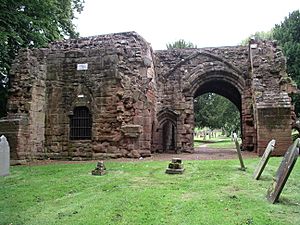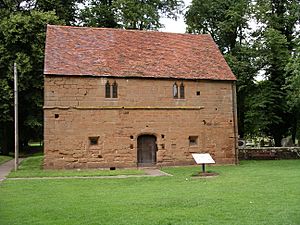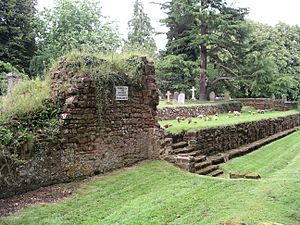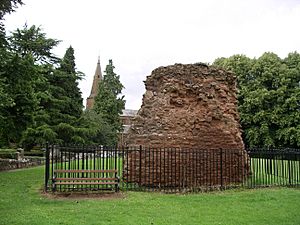St Mary's Abbey, Kenilworth facts for kids
St Mary's Abbey was once a very important religious building in Kenilworth, Warwickshire, England. Today, only its ruins remain. You can find these old parts near St Nicholas' Church and in a nearby area called Abbey Fields. Some of the ruins are still visible above the ground, while others are hidden underground.
Contents
Discovering St Mary's Abbey's Past
How the Abbey Began
St Mary's Abbey started as a priory around 1124. A priory is a type of monastery where religious people live and work. It was built by a man named Geoffrey de Clinton. He also built Kenilworth Castle around the same time.
This priory was home to Augustinian canons. Canons were like priests who followed special rules. Geoffrey de Clinton gave the priory more land. He also helped create gardens and pools nearby.
Growing Bigger and Richer
Over time, more buildings were added to the priory. These included a barn, a gatehouse, and a belltower. There was also an infirmary, which was like a hospital. St Nicholas' Church was built close by in 1291.
The priory slowly became very wealthy. Because it was so important, the Pope gave it a higher status in 1447. It was then known as an abbey. An abbey is a larger, more important monastery.
The Abbey's End
In 1538, a big change happened in England. King Henry VIII decided to close many monasteries. This event is known as the Dissolution of the Monasteries. St Mary's Abbey was given to the King on April 15, 1538.
The head of the abbey, called the Abbot, received a good payment. Other monks also received money. After this, the abbey was taken apart. By the 1700s, most of it was in ruins. Only the gatehouse and the barn remained standing.
Uncovering Hidden History
People started digging up the ruins in 1840. More digs happened in 1880 and 1922. These excavations helped us learn more about the abbey. To protect the ruins, most of them were covered up in 1967.
In recent years, new projects have helped people learn about St Mary's Abbey. Local councils and the Heritage Lottery Fund helped pay for these. Now, there is an exhibition in the old barn. You can also find special plaques around the site. These plaques explain the history of different parts of the abbey.
 | Sharif Bey |
 | Hale Woodruff |
 | Richmond Barthé |
 | Purvis Young |





